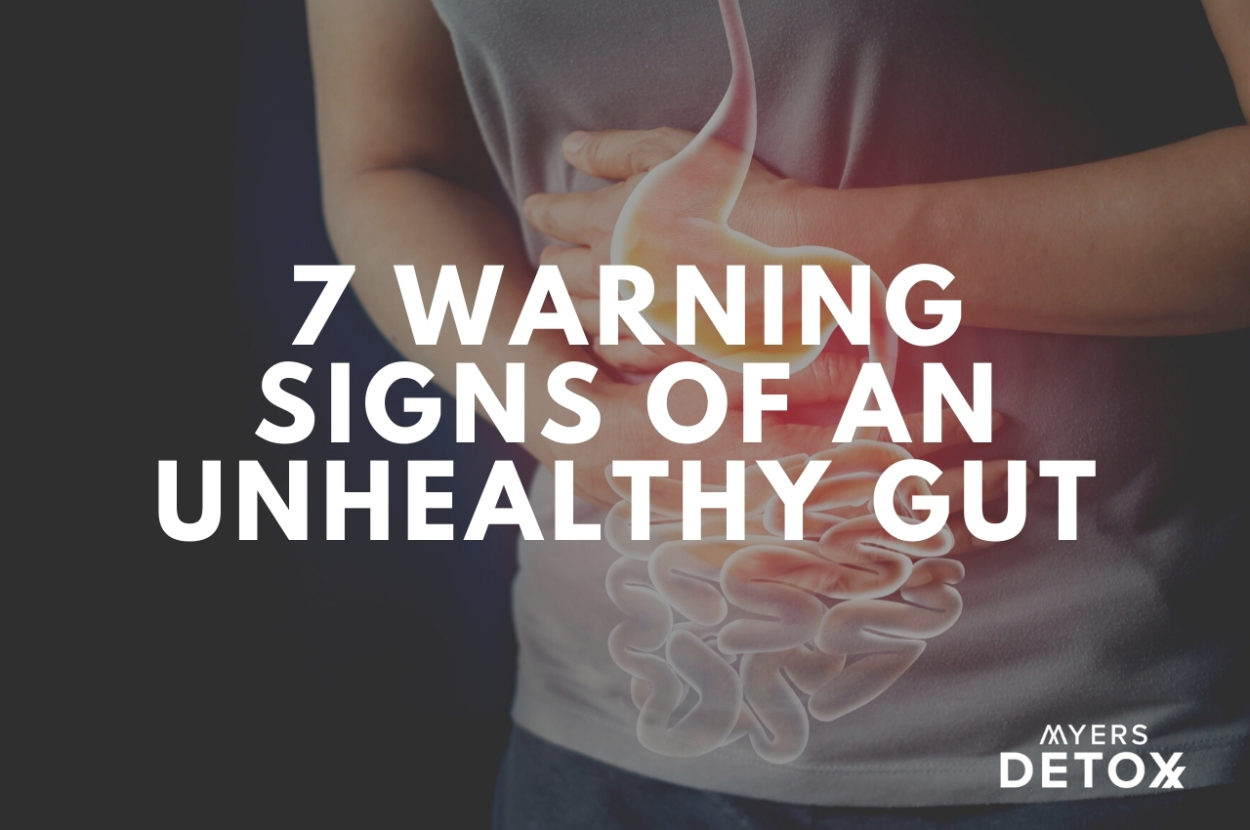As research into the gut microbiome continues to grow, scientists are discovering the vast array of roles that your gut bacteria play in your body. Everything, including energy production, metabolism, sleep, and cognitive health, are impacted by these little microorganisms that live in your gut. A healthy, balanced gut microbiome is required for a healthy body, hormones and mood.
However, when your gut bacteria become imbalanced (a condition known as dysbiosis), the effects can be widespread in your body. There are many interesting things that impact your gut microbiome that I want to share in this article – and how this affects your weight.
In this article, you’ll learn:
- The key signs that your gut bacteria are imbalanced
- How a healthy gut is crucial for weight loss
- Why impaired gut health is devastating to cognitive function
- How your microbiota can mess with your hormones, neurotransmitters, and inflammatory messengers
- The three vital steps you have to take to get control over your gut health
- The most effective protocol for reclaiming gut bacteria balance
Signs That Your Gut Health May Be Suffering
#1 Weight Gain
Your gut bacteria may be the key to lasting weight loss.
In fact, several lines of reasoning connect a healthy gut microbiome with a healthy metabolism.
For instance, while there are many different approaches to reduce obesity, one thing that many have in common is a shift in the balance of gut bacteria.
Furthermore, it’s well understood that your gut microbiome impacts nutrient metabolism and can affect energy expenditure, which are two key factors in weight maintenance.
And finally, studies have shown that supplementing with probiotics (which help to balance your gut bacteria) can alter the secretion of hormones and neurotransmitters, which prevent overeating and weight gain[1][2].
#2 Sugar Cravings
If you’ve noticed a sharp spike in sugar cravings, it may be your gut bacteria that are sending you impulses for cookies and candy.
Gut bacteria, just like you, thrive off of specific nutrients. While beneficial bacteria will work on the fiber you feed yourself, many strains of harmful bacteria, like candida, thrive and reproduce from eating sugar.
Your gut bacteria can signal sugar cravings through a few different mechanisms[3]:
- They can influence your reward and satiety pathways in your brain
- They can alter your mood
- They can change your taste receptors
- They can hijack your vagus nerve, which is responsible for stress management (high stress equals low self-control)
- They send out chemical messengers that make you crave sugar and carbs
#3 Low Energy
One of the roles that your gut bacteria play is to assist with the digestive process. When in balance, your microbiota help to extract nutrients and break them down so that they’re readily available for absorption. This process is crucial for turning the food you eat into viable energy for your body[4].
When your microbiome is out of balance, however, the energy from your food is less available, and this may translate into fatigue and low-energy.
In fact, research shows that there is a strong correlation between chronic fatigue syndrome and dysbiosis[5].
And if you’re not breaking down and absorbing all that healthy, organic food you’re eating, you’re going to crave more food until you get the nutrients you need. This is a huge underlying root cause of weight gain.
#4 Poor Sleep
Research shows that a poor night of sleep can impact the balance of your gut microbiome. Interestingly, it also appears that imbalances in your gut microbiome can set you up for disturbed sleep[6].
Due to your microbiota’s role in the metabolism of amino acids and vitamins in your gut, when there is an imbalance in your microbiome, the neurotransmitters that your brain requires for proper sleep may not be properly synthesized.
In one animal model, the neurotransmitter serotonin was significantly reduced in mice with dysbiosis. Serotonin is a precursor to the sleep hormone melatonin, which explained why the mice exhibited poor sleeping behaviors[7]. You must have adequate melatonin levels in order to get proper, restful, restorative sleep.
#5 Digestive Issues
One of the most tell-tale signs that your gut bacteria is out of balance is the onset of digestive issues. Due to the imperative role that your gut bacteria play in your digestive system when your microbiome is out of balance, you’ll often feel digestive discomfort.
Depending on the specific bacteria and your tendency towards diarrhea or constipation, you may experience a range of symptoms like gas, bloating, diarrhea, or constipation[8][9][10].In the case of IBS (irritable bowel syndrome), you may experience both constipation and diarrhea off and on. The good news is since IBS is correlated with gut immunity, researchers suggest that balancing the microbiome may be the most effective way to support this condition[11].*
#6 Mood Issues
Due to the vast network of communication between your gut and your brain, your brain function will often suffer when your gut health is disrupted. Research shows that dysbiosis and inflammation in your gut may be linked to several mental illnesses, including anxiety and depression[12].*
From birth, your microbiome plays a critical role in programming your stress reactivity and something called your HPA axis (hypothalamic-pituitary-adrenal). Your HPA axis is involved in your stress response, and dysregulation of this system can lead to feelings of depression and anxiety[13][14].
In fact, your gut microbiome’s role in mental health is so strong that many researchers urge the psychological health community to embrace the essential nature of a healthy gut when addressing psychological disorders[15].
#7 Impaired Cognitive Function
Disruptions in cognitive health is another way that the gut-brain connection shows up.
Research suggests that your microbiota play a role in neuroinflammation (brain inflammation) due to the connection between your gut and your brain. While neuroinflammation has been indicated as a contributing factor for neurological diseases like Alzheimer’s and Parkinson’s disease, less severe cases of cognitive dysfunction may also result from dysbiosis[16][17].
Specifically, clinical and animal studies have found strong correlations between imbalanced gut bacteria and difficulty with memory, learning, and concentration. Some research also suggests that supplementing with probiotics may alleviate these symptoms as the gut microbiome rebalances itself[18][19].
The Key Steps To Supporting Gut Health
If any or all of the above signs of gut imbalance apply to you, it’s time for a gut health reset.
So, how do you do it? The three critical aspects of a gut reset include nutrition, detox, and stress relief.
#1 Nutrition
Poor diet is one of the biggest contributors to dysbiosis. Your gut bacteria feed off of the food you eat. If you’re eating healthy food, then healthy gut bacteria flourish; if you’re eating unhealthy food, unhealthy bacteria flourish[3].
Unfortunately, once the unhealthy bacteria in your gut take the lead, it can result in cravings for unhealthy food, which starts a never-ending cycle of unhealthy eating and unhealthy bacteria growth.
This is why cleaning up your diet and eliminating low-quality and inflammatory foods like sugar, refined carbohydrates, processed foods, and low-quality animal protein is crucial for rebalancing your microbiome.
#2 Detox
Environmental toxins like heavy metals and pesticides are everywhere in our air, food and water supply. Even if you consume only the highest quality food and the purest water, these chemicals still find their way into your body through the environment. This is why I always recommend that detox be a part of your regular wellness routine.
When it comes to gut bacteria, research shows that heavy metals and pesticides can induce a disruption in your bacterial balance and lead to dysbiosis[20][21]. For instance, glyphosate herbicide that is on most nonorganic food dramatically disrupts and kills off healthy gut bacteria.
Additionally, many toxic metals indirectly interfere in digestion by reducing energy production, of which a lot is required for digestion and assimilation of nutrients.
By supporting your detoxification pathways, you’ll eliminate these potential threats to your gut health while simultaneously supporting liver function.
#3 Stress Relief
Interestingly, stress plays a significant role in the balance of your gut microbiota. Due to the gut-brain axis, when our gut bacteria is off, we can feel more stress, anxiety, and depression. But this highway is a two-way street, and when we feel more stress or emotional imbalance, it can also lead to more stress in our gut via the alteration of inflammatory chemicals and hormones[22].
The bacteria in your gut produce neurochemicals that are sent to your brain to help regulate mood and emotions. When in balance, these chemicals will help you to feel calm and relaxed. When out of balance, however, your gut bacteria may not be able to make enough of the calming chemicals — leaving many people feeling stressed and anxious.
Research shows that even mild stress can create an imbalance in your gut bacteria. This triggers a cascade of stress-induced dysbiosis, leading to more stress chemicals being sent to your brain via your gut, which sets you up for more emotional stress, which further disrupts your gut health[23].
To stop the cycle, finding a stress relief protocol that works for you is essential.
Your 14-Day Gut Health Reset Plan
Going it alone can be intimidating when it comes to making changes in your health. That’s why I put together a 14-Day Weight Loss and Mind-Body Detox Challenge.
During this challenge, we’ll work on a variety of health goals, from weight loss, detox, and energy, addressing emotional trauma and stress reduction. And, of course, improved gut health will be just one of the beneficial outcomes.
If you feel like your health needs a little reboot after the last year, you’re not alone. In fact, the protocols and suggestions I’ve included in this 14-Day Weight Loss and Mind-Body Detox Challenge all came from my own practice of getting back into balance after this year of stress, challenges and changes.
I gained 19 lbs with the stress of this past year and then lost it with these tools in this challenge.
In an effort to make things as straightforward, simple, and effective for you, I’ve included 3 webinars, live Q&As, a cookbook, meal plans and much more so that you’ll feel completely supported on your two-week journey and beyond.
This 14-day challenge will address all three crucial aspects of gut health: nutrition, detoxification, and stress reduction techniques.
Takeaway
Your gut microbiome plays a role in every system of your body. When these little gut bacteria are out of balance, your body is out of balance — there’s no way around it.
As evidence continues to emerge supporting the crucial nature of a healthy gut microbiome, strategies for supporting gut health continue to come forward. Nutrition, stress management, and detoxification are three critical factors for getting your gut back into balance and feeling your best.
If you’re looking for a safe, effective, and efficient way to restore balance to your microbiome, I invite you to try my 14-Day Weight Loss and Mind-Body Detox Challenge. During these two weeks, you’ll receive the motivation, knowledge, and support that you’ll need to make lasting changes in your health.
*These statements have not been reviewed by the FDA. The 14-Day Weight Loss and Mind-Body Detox Challenge is not designed to treat, cure, or prevent any disease. It is not intended to replace any medication or healing modality prescribed by your medical doctor.











